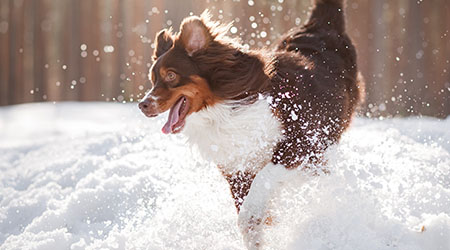Winter Pet Safety – From Antifreeze to Icy Walks
By Shara Bankhead, BS, CVT,
Director of Human Resources, Metropolitan Veterinary Associates
While the holiday winter wonderland season has passed, winter is truly here this month, and with these colder temperatures come some hidden dangers for pets!
Antifreeze
This common fluid found in most garages is necessary for our cars, but can be deadly for pets! Dogs are most likely to ingest antifreeze, but cats have been known to lap it up as well due to its sweet smell and taste. This is a HUGE concern as the primary chemical ingredient in antifreeze is ethylene glycol. This chemical elicits an almost immediate effect – similar to what is seen in alcohol poisoning (altered mental state, difficulty walking/balancing). It rapidly progresses into full nervous system depression and kidney failure, with the damage reaching its peak between 12-36 hours for both cats and dogs.
Is antifreeze poisoning treatable? Sadly, even with emergency veterinary care and aggressive IV fluid therapy, the prognosis is guarded to poor for full recovery.
So please remember to keep any antifreeze securely sealed and well out of your pet’s reach, and clean up spills immediately.
Salt/Snow Melt
Part of winter life for many is keeping steps, sidewalks, and driveways safe to walk on by using rock salt and/or snow melt. Many types of ice melt contain toxic chemicals or salts, and are not safe for pets – especially if they lick their paws after walking outside. The best way to keep your pet safe in icy weather is to choose pet friendly ice melt, or clean paws thoroughly when your pet comes inside.
There are many pet friendly options including Safe Paw, Safe Step, Morton’s Ice Melt, etc. If you live in a development with an HOA, talk to your board members about what is being used throughout your neighborhood. Chances are, there’s more than one pet owner concerned about their pet’s safety!
Check Under the Hood!
If any outdoor kitties call your neighborhood home, please, please, PLEASE check under your cars, in the wheel wells, and up and under the chassis! When temperatures drop, these heat seeking animals will seek out any source of warmth, and if they choose a vehicle and that vehicle gets started while they’re still snuggled in/on it, they can get severely burned, have limbs amputated, or be killed.
Temperature extremes
If it’s too cold for you to venture outside, it’s too cold for your pets!
As a general rule of thumb is if it’s below freezing, in and out potty breaks are all it takes. Granted, some pups need more exercise, and that is perfectly fine. Depending how long of a walk/run you are going on, consider a coat or sweater for your dog and ensure that they are dry and warm once you’ve returned home.
Help! I’ve Fallen…
Even our sure-footed felines can lose their traction, and fractured limbs, slipped discs, and sprains can also happen to them – and their canine counterparts!
Should you notice your pet holding up a limb, hear a yelp of pain, or notice that one of their limbs is swollen, please call your veterinarian or bring them to see MVA’s emergency service.
It can be very dangerous to attempt to treat these injuries at home – most human anti-inflammatories are toxic to pets, and any type of splint/immobilization could result in you being bitten. While you may have the experience to handle this type of injury, there may be more going on that you cannot assess without an x-ray or veterinarian’s evaluation.
Stay warm, be safe, and remember, MVA is here for you pets 24 hours a day, 7 days a week, 365 days a year. Even holidays.
Ask A Question
It’s important that our patients and their families can get to know our doctors and the facility. Ask us a question about anything for a chance to see it answered on our blog.
